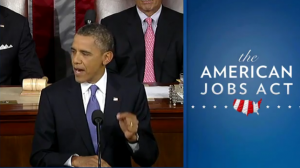Last week, President Barack Obama called on Congress to pass The American Jobs Act. The act’s proposals run the gamut from tax breaks to stimulus spending, and policy experts’ reactions to the bill ran the gamut too. But it’s still unclear whether the bill will actually help Americans, and New Yorkers in particular, get jobs. So let’s parse through the three best arguments for and against the bill.
Positive Reviews:
1. One of the most fervent supporters of the act is New York City Comptroller John Liu. For every $1 billion invested in New York City, Liu’s office estimates that 7,500 jobs would be created. Obama’s plan would funnel approximately $3 billion to New York State, but it’s not known how much of that would go to the five boroughs.
2. Obama’s proposal would give New York State about $2 billion to retain teacher and first responder jobs, and another $2 billion to modernize public schools in the state. New York State United Teachers, which represents 600,000 educators in New York, sided with the president because of that funding.
3. While America seems to be growing less fond of Obama in general, 45 percent of people surveyed by Gallup responded that they’d want their member of congress to vote for the act, compared with 32 percent that would vote against.
Negative Reviews:
1. James Parrott, the chief economist at the Fiscal Policy Institute says the jobs act is too heavy on tax cuts (toward bottom of article). He says federal spending creates many more jobs per dollar than tax cuts do.
2. Business groups are saying the payroll tax cuts might seem business-friendly, but in reality can’t help in the long-term because businesses are struggling too much to hire new workers.
3. The president of the same teachers union that supports the bill (NYSUT) thinks it might be used as an excuse to not fund New York schools on a state-level.
Unless Obama finds a way to convince a vocally opposed Republican party otherwise, all the praise and criticism of the bill might be moot.

